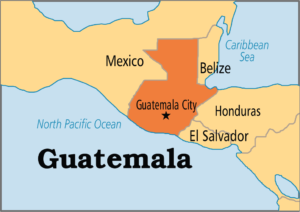TODAY’S READING FROM THE OLD TESTAMENT- 1 KINGS 3:4-4:34
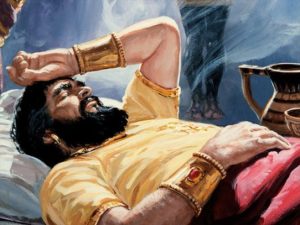 Solomon goes to Gibeon, the most important high place, to worship the Lord. He offers 10,000 burnt offerings. While he is there, during the night, he has a dream in which the Lord appears to him and gives him this gracious invitation to ask Him for whatever he wants.
Solomon goes to Gibeon, the most important high place, to worship the Lord. He offers 10,000 burnt offerings. While he is there, during the night, he has a dream in which the Lord appears to him and gives him this gracious invitation to ask Him for whatever he wants.
“Ask for whatever you want Me to give you” (1 Kings 3:5).
This is the invitation that God gives those who are rightly related to Him by faith in His Son, the greater Solomon, the Lord Jesus Christ. God encourages us to make our requests known to Him in Jesus’ Name.
 “Ask and it will be given you” (Matthew 7:7).
“Ask and it will be given you” (Matthew 7:7).
“And whatever you ask in prayer, you will receive, if you have faith” (Matthew 21:22).
“Therefore, I say to you, all things for which you pray and ask, believe that you have received them, and they will be granted you (Mark 11:24).
“If you then, who are evil, know how to give good gifts to your children, how much more will the heavenly Father give the Holy Spirit to those who ask Him” (Luke 11:13).
“Whatever you ask in my name, this I will do, that the Father may be glorified in the Son” (John 14:13).
“If you ask anything in my name, I will do it” (John 14:14).
“If you abide in me, and my words abide in you, ask whatever you wish, and it will be done for you” (John 15:7).
“Truly, truly I say to you, whatever you ask of the Father in my name, he will give it to you” (John 16:23).
“Ask, and you will receive, that your joy may be full” (John 16:24).
 “And whatever we ask, we receive from Him, because we keep His commandments and do what pleases Him” (1 John 3:22).
“And whatever we ask, we receive from Him, because we keep His commandments and do what pleases Him” (1 John 3:22).
“And this is the confidence that we have toward him, that if we ask anything according to His will, He hears us. And if we know He hears us in whatever we ask, we know that we have the requests that we asked of Him” (1 John 5:14-15).
“You do not have because you do not ask” (James 4:2).
“If any of you lacks wisdom, let him ask God, who gives generously to all without reproach, and it will be given him.” (James 1:5).
“Now unto Him who is able to do far more abundantly beyond all we could ask or think, according to the power that works within us” (Ephesians 3:20).
 Solomon asks not for riches, the destruction of his enemies, or long life. He asks for wisdom- a discerning heart. He asks for the ability to govern and distinguish right and wrong. This request is in line with God’s original intention for mankind. God wants us to seek first His kingdom and His righteousness.
Solomon asks not for riches, the destruction of his enemies, or long life. He asks for wisdom- a discerning heart. He asks for the ability to govern and distinguish right and wrong. This request is in line with God’s original intention for mankind. God wants us to seek first His kingdom and His righteousness.
God is pleased with Solomon’s request. He promises to give Solomon discernment in administering justice. He gives Solomon a wise heart and the promise to cause him to excel. He also says that he will add all these other things. He will give him what he did not ask for- riches and honor, and if He obeys His Word, long life. God promises to distinguish Solomon’s kingdom with unique glory that will foreshadow the glory of the kingdom to come.
Solomon awakes and realizes this was all in a dream but that God’s promise to him was real.
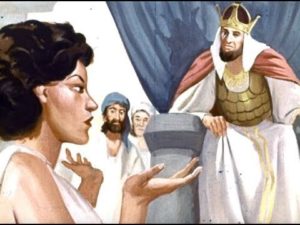 The gift of Solomon’s wise and discerning heart was put on display in the incident of the two prostitutes who came before him with their unique dilemma. Both women lived in the same house and delivered baby boys within three days of each other. However, one baby died of suffocation because the mother laid on the child. She secretly places the dead baby at the breast of the other mother and takes the surviving baby back to her bed as her own. The other mother wakes up to discover a dead baby at her breast. Soon she recognizes that this is not her own and accuses the other new mother of switching the babies. This dilemma is brought before Solomon.
The gift of Solomon’s wise and discerning heart was put on display in the incident of the two prostitutes who came before him with their unique dilemma. Both women lived in the same house and delivered baby boys within three days of each other. However, one baby died of suffocation because the mother laid on the child. She secretly places the dead baby at the breast of the other mother and takes the surviving baby back to her bed as her own. The other mother wakes up to discover a dead baby at her breast. Soon she recognizes that this is not her own and accuses the other new mother of switching the babies. This dilemma is brought before Solomon.
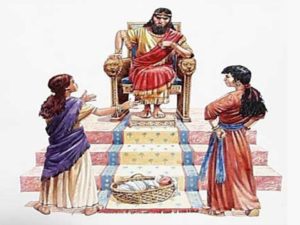 Solomon asks for a sword. Will the real mother please stand up?
Solomon asks for a sword. Will the real mother please stand up?
He proposes that he cut the surviving child in half and give half to one and half to the other. Of course, the real mother of the child is the one who protests and would rather give the child away than kill it.
The king wisely gives the ruling, “Give the living baby to the first woman. Do not kill him. She is his mother.”
Solomon, whose name is derived from the Hebrew word, ‘shalom,’ meaning peace, reigns over the people of Judah and Israel in a united kingdom, a kingdom that is at peace with its neighboring nations.
He arranges his chief officials (4:2-6) and governors (4:7-19), each one having their own delegated responsibilities and jurisdictions. The people prosper and become as numerous ‘as the sand on the seashore,’ a cultural expression for innumerable abundance.
A very impressive inventory of possessions is listed during this golden era of the monarchy.
The symbols of prosperity in Israel are used to describe this short period of peace in their history.
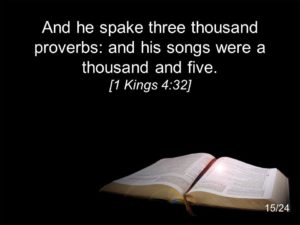 1 Kings 4:25 25 So Judah and Israel lived in safety, every man under his vine and his fig tree, from Dan even to Beersheba, all the days of Solomon.
1 Kings 4:25 25 So Judah and Israel lived in safety, every man under his vine and his fig tree, from Dan even to Beersheba, all the days of Solomon.
This chapter also gives us insight into some of Solomon’s accomplishments:
1 Kings 4:32-34 32 He also spoke 3,000 proverbs, and his songs were 1,005. 33 He spoke of trees, from the cedar that is in Lebanon even to the hyssop that grows on the wall; he spoke also of animals and birds and creeping things and fish. 34 Men came from all peoples to hear the wisdom of Solomon, from all the kings of the earth who had heard of his wisdom.
When we consider Solomon’s kingdom and accomplishments as high benchmarks in the Old Testament, it makes Jesus’ words regarding Himself all the more attention-grabbing:
Matthew 12:42 42 The Queen of the South will rise at the judgment with this generation and condemn it; for she came from the ends of the earth to listen to Solomon’s wisdom, and now one greater than Solomon is here.
TODAY’S READING FROM THE NEW TESTAMENT – ACTS 6:1-15
 Acts 6 describes some of the growing pains of the early church. The new assembly was reflecting ethnic diversity and ethnic tensions. As the church members lived out the gospel, they initiated a daily distribution of food, giving attention to those who were in particular need, widows who had no means of family support. However, long-held ethnic biases begin to show up in how the Hebraic Jews treat the Grecian widows.
Acts 6 describes some of the growing pains of the early church. The new assembly was reflecting ethnic diversity and ethnic tensions. As the church members lived out the gospel, they initiated a daily distribution of food, giving attention to those who were in particular need, widows who had no means of family support. However, long-held ethnic biases begin to show up in how the Hebraic Jews treat the Grecian widows.
The Twelve realized that this injustice must be dealt with. It could not be ignored. Yet dealing with this growing schism and rectifying the unequal treatment of the widows would be time-consuming and require spiritual wisdom and maturity. What were they to do?
The apostles could not forsake their priority task and recognize that their calling to prayerfully lead and feed the flock would be compromised if they personally took on the project of reforming the daily distribution of food and counseling those involved.
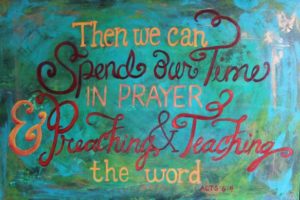 Acts 6:2 2 And the twelve summoned the full number of the disciples and said, “It is not right that we should give up preaching the word of God to serve tables.
Acts 6:2 2 And the twelve summoned the full number of the disciples and said, “It is not right that we should give up preaching the word of God to serve tables.
The Apostles ask the congregation to choose seven men from among them “who are known to be full of the Spirit and wisdom.”
Seven men are chosen, and the task is delegated to them. Among the seven are two men whom we will hear about soon in the Book of Acts- Stephen and Philip.
The conflict was resolved, the apostles stick to prayer and the ministry of the Word, the gospel is spread, and the church grows. Luke throws in this encouraging detail- “a large number of priests became obedient to the faith” (Acts 6:7). The implication is that they were once enemies of the gospel, and had been turned to the Lord through the persistent efforts of the church to pray, love, testify of Christ and serve.
Stephen is introduced as “a man full of God’s grace and power.” Although not an apostle, his ministry is accompanied with miraculous signs.
The Jews of Cyrene and Alexandria, Cilicia and Asia, members of the Synagogue of Freedmen, realize that they cannot stand up to the wisdom or the Spirit by which Stephen spoke. They oppose Stephen by slandering his ministry, accusing him of words of blasphemy against Moses and against God.
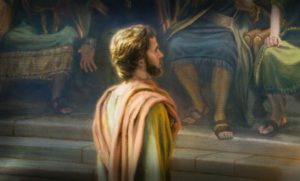 They seize Stephen and deliver him to the Sanhedrin. They produce false witnesses. Their main charges against Stephen are that 1) He speaks against the temple, 2) He speaks against the law, and 3) That this Jesus will destroy the temple and change the customs Moses handed down to all.
They seize Stephen and deliver him to the Sanhedrin. They produce false witnesses. Their main charges against Stephen are that 1) He speaks against the temple, 2) He speaks against the law, and 3) That this Jesus will destroy the temple and change the customs Moses handed down to all.
Stephen will answer these 3 charges in his rebuttal.
TODAY’S READING FROM THE BOOK OF PSALMS- PSALMS 126:1-6
 This is a song about the restoration of God’s people to Jerusalem after being taken into their captivity in Babylon.
This is a song about the restoration of God’s people to Jerusalem after being taken into their captivity in Babylon.
Psalm 126:1 1 When the LORD brought back the captive ones of Zion, we were like those who dream.
And yet, there is a sad note to the psalm, indicating that their restoration was not yet complete.
Psalm 126:4 4 Restore our captivity, O LORD, As the streams in the South.
To the south of Judea is the barren desert region, where in the summer, the streams cease to flow. So this cry for restoration is a request for the replenishing supply of living water.
The Psalm ends on the note of confidence.
Psalm 126:5-6 5 Those who sow in tears shall reap with joyful shouting. 6 He who goes to and fro weeping, carrying his bag of seed, shall indeed come again with a shout of joy, bringing his sheaves with him.
TODAY’S READING FROM THE BOOK OF PROVERBS- PROVERBS 16:26-27
Proverbs 16:26-27 26 A worker’s appetite works for him, for his hunger urges him on. 27 A worthless man digs up evil, while his words are like scorching fire.
God gives us hunger for a purpose. Not only do we need food. We need productive labor.
A man who plots slander by digging up evil and destroying his opponents with slander is wicked and worthless.
PRAY FOR THE NATIONS – Guatemala (from “Operation World” Prayer Guide and Prayercast.com)
Guatemala
Latin America
Nestled in the heart of Central America, just south of Mexico, is the country of Guatemala. Its varied landscapes and climates as well as the many Mayan ruins scattered throughout the country, attract visitors every year. Tourists and collectors alike seek after the beautiful Guatemalan handicrafts such as clothing, pottery, and woodworking. Over half of the population of Guatemala is descended from the Mayan civilization, and they speak 22 Mayan-based indigenous languages. Spain’s conquest of Guatemala in 1532 introduced the Spanish language and culture, which is reflected in Guatemala’s culture today.
Guatemala’s beautiful countryside belies a troubled political past. In 1996, the government signed a peace treaty ending a civil war that had been raging for 36 years. The end of the war signaled progress for the nation, but the effects of the war are still felt. Gang and organized crime violence and drug trafficking test the government and police control. Economically, more than half the population is living in poverty, and over 40 percent of the children under the age of five are malnourished. Guatemala’s profitable production of coffee, sugar, and bananas for export has contributed to less production of grains, which have to be imported for food.
Catholicism, introduced by the Spanish and syncretized with Mayan religions, controls most religious life in Guatemala. Early in the twentieth century, Protestant churches started to make an impact, and the evangelical church has been growing in influence since the 1960s. Even though there has been a revival of the Mayan culture and its religious rituals, there is a rise in church planting among indigenous groups. Bible translations have aided this, and all tribes in Guatemala have been reached with the Gospel.
Geography
Area: 108,889 sq. km
A land of mountains, volcanoes and lakes. Mexico’s southern neighbor.
Population: 14,376,881 Annual Growth: 2.50%
Capital: Guatemala City
Urbanites: 49.5%
HDI Rank: 122 of 182 (UN Human Development Reports 2009)
Peoples
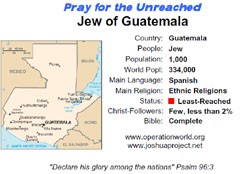 Peoples: 60 (2% unreached) All peoples
Peoples: 60 (2% unreached) All peoples
Unreached Peoples Prayer Card
Official language: Spanish; 23 recognized Amerindian languages Languages: 42 All languages
Religion
Largest Religion: Christian
| Religion | Pop % | Ann Gr | |
| Christians | 13,819,058 | 96.12 | 2.4 |
| Evangelicals | 3,514,428 | 24.4 | 3.2 |
Challenges for Prayer
Mayan culture is enjoying a renaissance after the rediscovery of their ancient civilization. For some, this is a resurrection of the old, long-submerged Mayan religion, but to others, it is a blossoming of indigenous Christianity aided by the many new translations of the Bible in indigenous languages. There are church-planting movements among many groups, most notably the Kekchi (Baptists and Mennonites). CAMI, CoN, and Mennonites also work among Mayan peoples. There has been outreach to every tribe. Pray for these churches to become mature, effectively led, and a vital contribution to the Church in the nation.
PRAYER: Father, thank You for encouraging us to ask for whatever we wish in accordance to Your revealed will. We come to you boldly, knowing that You delight in the perfection of Your Son, who offered Himself on our behalf, our greater Solomon, who has secured our favor. We know that You delight in our seeking first Your kingdom and hearing our prayer. We believe You are our heavenly Father and will not give a stone if we ask for bread. So we pray that You will continue to feed us the Living Bread of Your Word and strengthen us to do the work You have assigned to us. May we bring forth fruit to Your glory. In Jesus’ Name. Amen.

